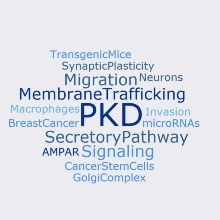How kinases control membrane trafficking
We investigate how membranes of the secretory pathway are regulated by signal transduction pathways. Here, we are particularly interested in the role of the protein kinase D family. Specifically, we address how external cues control PKD activity and how the kinase engages its interactors and substrates to coordinate the secretory pathway.
Ultimately, we aim at determining the relevance of PKD in cell growth, polarity, migration and invasion, and stem cell maintenance to understand the impact of dys-regulation of PKD signaling and secretion in human diseases such as cancer and neurodegeneration.
Cell line engineering for improved production of therapeutic proteins
Chinese hamster ovary (CHO) cells are the most commonly used host for biopharmaceutical production. Although transcription and translation strategies have been employed to generate highly productive cell clones, secretion still remains a bottleneck for cellular productivity. By targeting the secretory pathway at multiple levels using synthetic biology tools, we aim to generate highly productive cell lines with predictable performance at an industrially relevant scale.
Technology platform
We employ an interdisciplinary approach combining 2D and 3D cell culture including primary cells from mice and humans, biochemistry, advanced microscopic techniques e.g. TIRF, FRET, and FRAP, image-based high-throughput screening, and in vivo mouse models.
Funded H2020 (MSCA 2019) project: SECRET - A MARIE SKŁODOWSKA-CURIE ACTIONS (MSCA) Innovative Training Network (ITN)
We will be exploring the SECRETory pathway regulation and its contribution to cancer by providing a highly qualified platform for European research training of bright young scientists, with the aim of defining secretory pathway-linked candidate biomarker genes suitable for cancer diagnosis and prognosis.
For details, check out the SECRET-ITN website: https://secret-itn.eu/
News
Sara Suárez López was a speaker at the GRS “Excitatory Synapses and Brain Function”
Sara Suárez López has been selected to present her research on the role of RIN1 in synaptic plasticity at the Gordon Research Seminar (GRS) on Excitatory Synapses and Brain Function in Manchester, USA. The GRS provides a unique forum for young doctoral and post-doctoral researchers to present their work, discuss new methods, cutting edge ideas, and pre-published data, as well as to build collaborative relationships with their peers.
Our new preprint is out! Check it out: Protein kinase D (PKD) has been classically associated with vesicle fission at the trans-Golgi network. We now show that endogenous PKD3 is located at late endosomes. Using a 3D-on-top culture system, we discovered a crucial role for PKD3 in maintaining Rab7 localization to these membranes, which subsequently promotes retromer recruitment and luminal acidification. This role of PKD3 in maintaining lysosomal homeostasis supports Wnt signaling to promote breast cancer stem cell formation.
We are part of the new interdisciplinary Research Training Group EpiSignal, which studies the crosstalk of intracellular signaling pathways and chromatin modification networks! Excellent opportunity to do a doctorate in a structured research and qualification program at a high professional level.
Recent publications
-
Protein Kinase D drives the secretion of invasion mediators in triple-negative breast cancer cell lines. Gali, A., Bijnsdorp, I. V., Piersma, S. R., Pham, T. V., Gutiérrez-Galindo, E., Kühnel, F., Tsolakos, N., Jimenez, C. R., Hausser, A. & Alexopoulos, L. G. (2024). iScience, 108958. doi: https://doi.org/10.1016/j.isci.2024.108958
- Membrane trafficking in breast cancer progression: protein kinase D comes into play. Gutiérrez-Galindo, E., Yilmaz, Z. H., & Hausser, A. (2023). Frontiers in cell and developmental biology, 11, 1173387. https://doi.org/10.3389/fcell.2023.1173387
- Dendritic effects of genetically encoded actin labelling probes in cultured hippocampal neurons. Ignácz A, Nagy-Herczeg D, Hausser A, Schlett K. Molecular Biology of the Cell. 2023. doi: 10.1091/mbc.E22-08-0331
- PKD autoinhibition in trans regulates activation loop autophosphorylation in cis. Reinhardt R, Hirzel K, Link G, Eisler SA, Hägele T, Parson MAH, Burke JE, Hausser A, Leonard TA. Proceedings of the National Academy of Sciences. 2023; 120(7):e2212909120. doi: 10.1073/pnas.2212909120
- Protein Kinase D promotes activity-dependent AMPA receptor endocytosis in hippocampal neurons. Oueslati Morales CO, Ignácz A, Bencsik N, Sziber Z, Rátkai AE, Lieb WS, Eisler SA, Szűcs A, Schlett K, Hausser A. Traffic. 2021 Sep 26. doi: 10.1111/tra.12819. Online ahead of print.
- Nucleobindin-1 regulates ECM degradation by promoting intra-Golgi trafficking of MMPs. Pacheco-Fernandez N, Pakdel M, Blank B, Sanchez-Gonzalez I, Weber K, Tran ML, Hecht TK, Gautsch R, Beck G, Perez F, Hausser A, Linder S, von Blume J. J Cell Biol. 2020 Aug 3;219(8):e201907058. doi: 10.1083/jcb.201907058. PMID: 32479594
Click here for a full publication list.
Our lab on ResearchGate
Follow us on Bluesky
Angelika Hausser on Bluesky: @angelikahausser.bsky.social
Lab members
Prof. Dr. Angelika Hausser (apl.), Lab head
Zeynep Hazal Yilmaz, PhD student
Sara Suárez López, PhD Student
Gisela Link, Technical assistant
Dilan Torcuk (Master Student)
David Gundermann (Bachelor Student)
Michael Müller (Bachelor Student)
Anastasia Gaitanidou (Assistant scientist)
Lab Group Sketch - by Dilan Torkuc
Open positions
Applications of students and scientists interested in signal transduction and membrane trafficking, and joining our team are always welcome! Please send your CV and a short summary of your research interests to Angelika Haußer.
Funding








